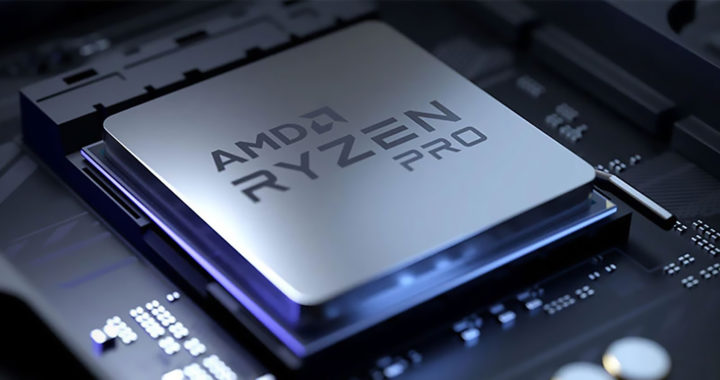AMD first introduced the AMD Ryzen PRO brand for its business-class multi-core mobile processors in 2017. It is specifically a sub-brand of the Ryzen line developed for various business environments and marketed toward business clients using workstations. The entire brand provides power-efficient productivity, remote management of systems in-band and out-of-band, and protection of sensitive data. It is a direct competitor of the Intel vPro platform. AMD processors bearing the PRO branding include several models of mainstream Ryzen CPUs, the Ryzen Threadripper line for desktop workstations, the general Ryzen Pro mobile workstation line.
Explaining AMD Ryzen PRO as a Dedicated Line of Microprocessors for Business-Class Computers
Advantages of AMD Ryzen PRO: Features and Selling Points
The AMD Ryzen PRO has clearer branding and differentiation. Take note that the Intel vPro is not a microprocessor but a platform consisting of different hardware-based technologies that are included in vPro-branded Intel Core or Intel Xeon processors. The AMD Ryzen PRO is a specific business-class segment of processors under the Ryzen line of microprocessors. These microprocessors are designed for the following business applications:
• Enterprise Computing: These processors are designed for high-performance enterprise computing applications. These include virtualization, database, and analytics.
• Workstation Computing: They are also suitable for high-performance workstation computing. These include graphic design and video editing.
• Thin Client Computing: These processors can also be used for thin client computing applications. These include point-of-sale systems and remote computing.
What makes these processors ideal for desktop computers or mobile workstations placed in a business environment is that they offer additional features not found in non-PRO Ryzen processors. These revolve around better and dedicated or exclusive security and management technologies and functionalities built on top of suitable processing capabilities and power efficiency.
Below are the specific advantages:
1. Security
Security is the main selling point and one of the advantages of AMD Ryzen PRO. Processors under this sub-brand include several security features. These are the integrated on-chip AMD Secure Processor, AMD Memory Guard for preventing unauthorized access to the memory, boot process authentication AMD Secure Boot, and compatibility with Microsoft Pluton Security and OEM-level security features.
2. Management
Devices running on Ryzen PRO processors come with a robust manageability feature set that simplifies device deployment and management. These include out-of-band management that allows the devices to be serviced even if they are turned off or offline, remote BIOS updates, device provisioning for setting up desired configurations, and support for Microsoft Endpoint Manager.
3. Performance
Another advantage of AMD Ryzen PRO is that its processors are built for both performance and power efficiency. They are specifically designed and tailor-fitted for business-oriented use cases. All processors under the sub-brand have multiple cores, high clock speeds and maximum clock speeds, and are based on the latest process node. They also feature Radeon integrated graphics processors.
4. Cost
The Intel vPro platform or Intel processors with the vPro branding are the direct competitors of AMD Ryzen PRO processors. The two brands provide almost the same general features for business-class computers. Cost or price is a notable difference. The AMD Ryzen 7 PRO 5850U processor costs USD 399.00 and the Intel Core i7-1185G7 processor costs USD 499.00. AMD Ryzen PRO is cheaper.
Disadvantages of AMD Ryzen PRO: Issues and Limitations
The aforesaid features and advantages of the AMD Ryzen PRO give mobile workstations or fleets of laptop computers an edge over other computers running on non-PRO Ryzen processors and even those running on processors not designed for business-class use cases.
It is also worth mentioning the fact that the applications of the AMD Ryzen PRO are confined to business environments. There are no strong reasons for individual users or home users to purchase a laptop running on PRO-branded Ryzen processors. Take note that PRO-branded processors are more expensive than non-PRO processors.
That the Intel vPro platform is the biggest competitor of the Ryzen PRO brand. The presence of this platform gives consumers an alternative option. It features several well-outlined technologies and capabilities that are unique to vPro-branded Intel processors.
Below are the specific disadvantages:
1. Higher Cost
The AMD Ryzen PRO is a more affordable business solution than the Intel vPro platform but PRO-branded processors are slightly more expensive than non-PRO Ryzen processors. Take note that the Ryzen 7 5800 PRO is priced at USD 499.00 while the Ryzen 7 5800X is priced at USD 449.00.
2. Availability
It is also important to note that non-PRO Ryzen processors are more accessible because they are geared toward the mainstream market segment. There are also fewer choices when it comes to devices with PRO-branded processors. Remember that the PRO line is marketed toward business customers.
3. Overclocking
Another disadvantage of AMD Ryzen PRO processors is that they are not as well-suited for overclocking as consumer-grade processors. This comes from the fact that these processors are designed for use in business environments where security and performance are essential. They are not meant to be overclocked.
4. Privacy
Computers running on these processors can be managed and controlled or services remotely or off-site. This feature raises privacy concerns and also creates additional security threats. Organizations need to develop and implement suitable measures and policies to mitigate potential risks.
5. Complexity
Deploying a fleet of computers running on these processors in a business environment might require a specialized set of skills for proper implementation. This comes from the fact that they include several features and important guidelines to allow organizations to maximize their capabilities and usefulness.
6. Overlaps
Some features of these processors may overlap with other enterprise-grade components or software solutions. Using them translates to unnecessary costs because their additional functionalities may not be needed in organizations with robust security measures and software solutions built into their IT infrastructures.
